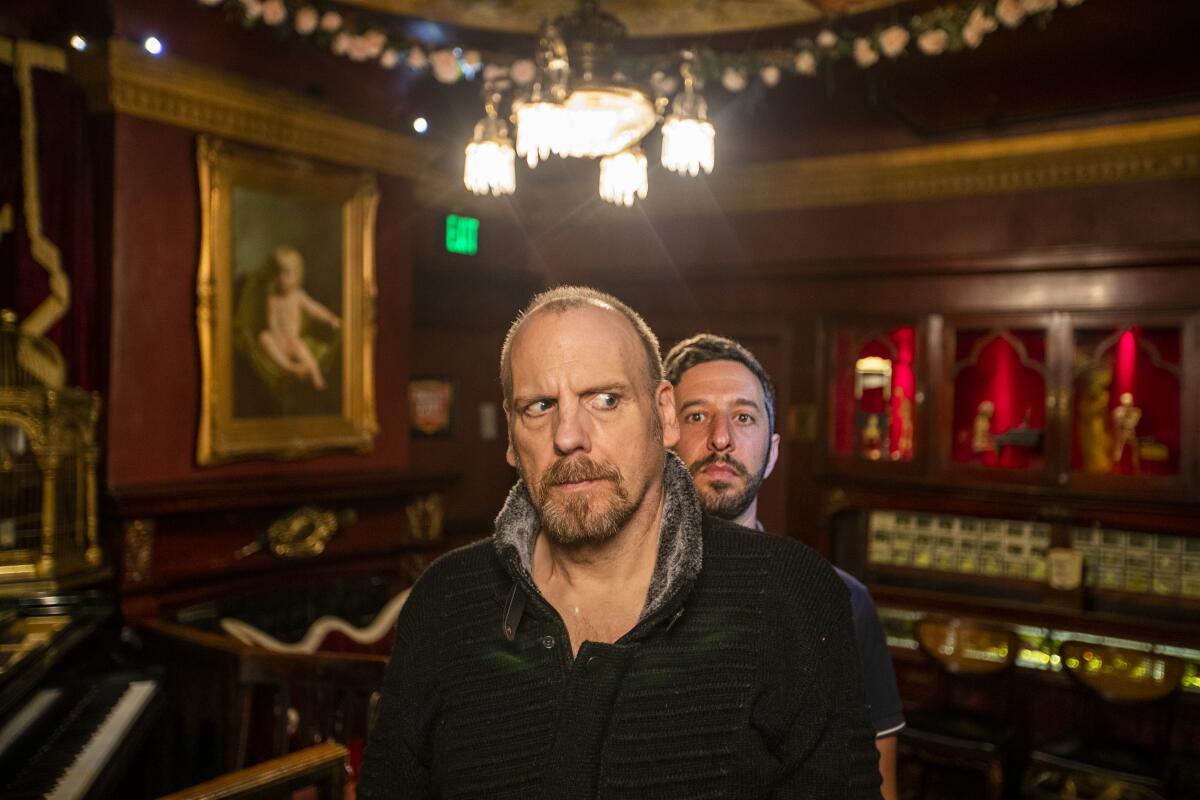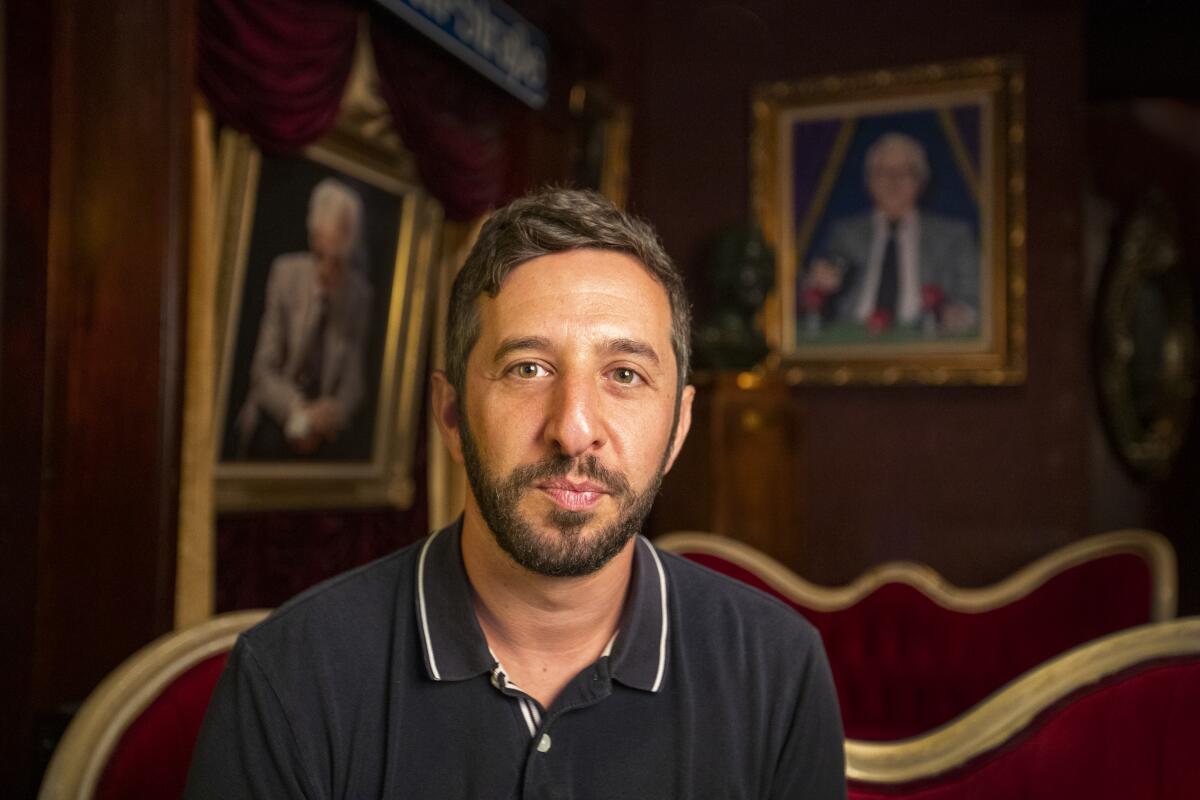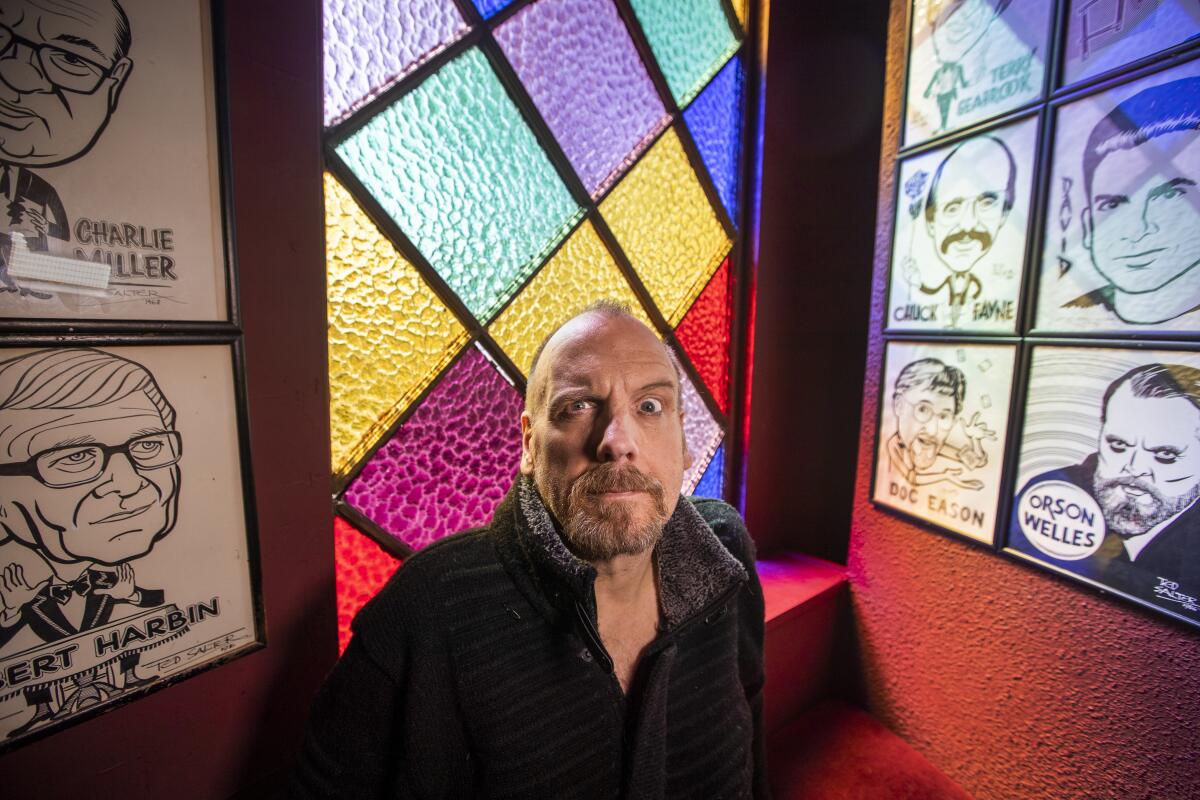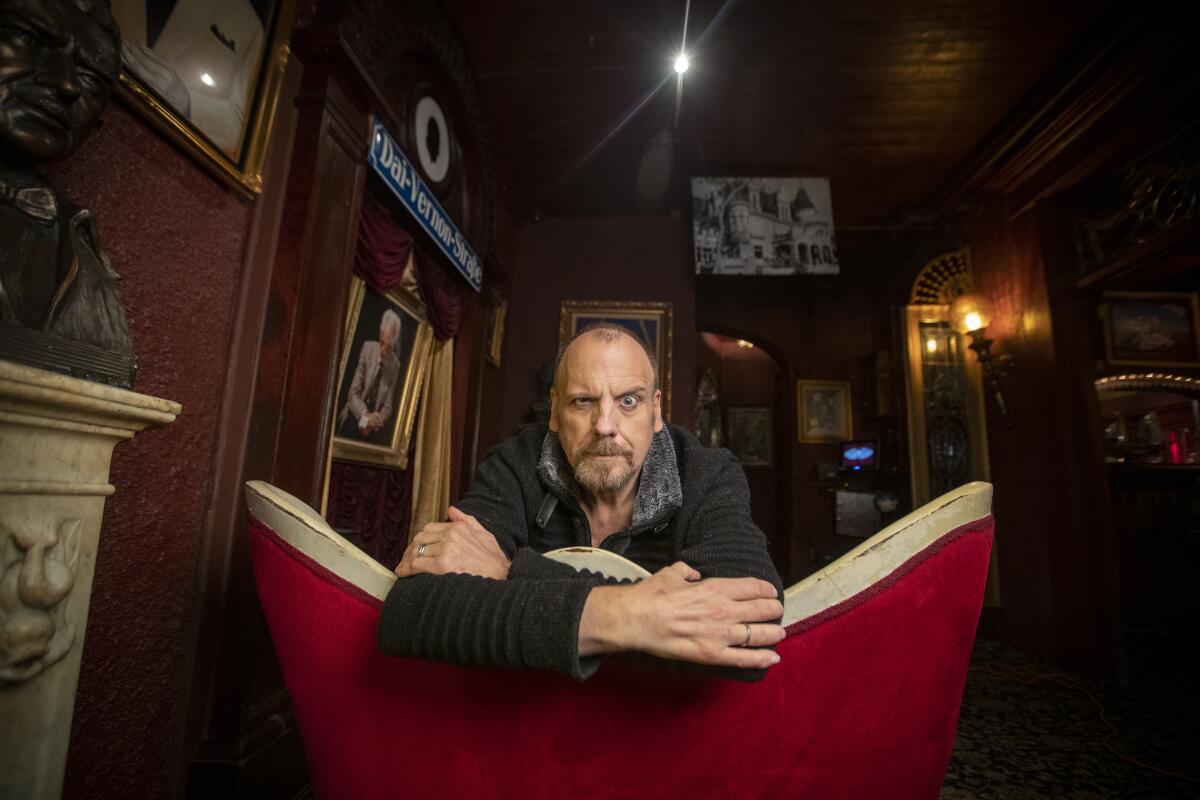In ‘Amazing Johnathan,’ a director confronts meth addiction — and maybe even tries it himself

- Share via
The filmmaker brought the meth pipe to his lips, eyeing the smoky glass bulb with apprehension.
“Now hit it,” he was instructed. “Hit it hard.”
Ben Berman had never tried the illegal drug before. He describes himself as “Jewish and very neurotic,” the kind of guy who gets a phone call from a relative and often worries it’s an indication that someone has died.
But his movie was falling apart. He was nearly two years into making a documentary about The Amazing Johnathan, a.k.a. John Szeles, a comic magician who’d been forced into early retirement in 2014 after being diagnosed with a fatal heart condition. Between his cardiomyopathy, diabetes and the fact that he was a raging addict who smoked meth multiple times a day, doctors gave Szeles a year to live. And yet here he was, almost 60 and somehow still breathing.
It was something of a miracle, and Berman wasn’t the only one who was intrigued. As the director began filming Szeles’ supposed final years, he learned that his subject had also granted access to competing documentary camera crews. One of which had supposedly won Academy Awards for their work. And while Berman was accomplished — producing shows like IFC’s “Comedy Bang! Bang!” and making two short films that got into the Sundance Film Festival — he didn’t have an Oscar.
Which is why, when Szeles suggested the two of them do meth together ... well, what happened next is still up for debate. In “The Amazing Johnathan Documentary,” which is now playing in select theaters and began streaming on Hulu last Friday, we never see Berman actually inhale. The instant the pipe meets his mouth, the frame freezes, a black box covers the drug paraphernalia and a lawyer’s voice-over is heard, advising him not to include any footage of himself engaging in illicit activity.
“I had a decision to make: To have the most interesting Johnathan film, would I do this or not?” says Berman, now 37. “I was repulsed by the idea that I could become a gimmick, but it is a bit of a gimmick. I’m not saying it’s right or wrong for a filmmaker to enter their movie and actively manipulate the situation, but those are the questions I’m hoping to raise.”

It was early August, and Berman was sitting in the living room of a house he’d recently started renting in Highland Park. The air conditioning was on full-blast, but he was sipping hot coffee. Every few moments his Papillon, Lentil, dropped a dog toy in his lap in an effort to get him to engage in a game of fetch.
Berman still won’t say whether or not he did meth. He thinks the mystery of it all adds to the thematic value of the film, which explores the boundaries of illusion and reality by questioning his subject’s honesty. But Szeles is clear about what went down that day in his Las Vegas mansion: He says Berman did one hit and then left.
“I didn’t want to be the one to turn him on to doing it, because what if he liked it?” Szeles says, calling from his home in Henderson, Nev. “But I knew he wasn’t going to become a drug addict. He’s an uptight Jewish guy with parents who would kill him. He doesn’t need it. Every hour or two, I go to the bathroom and do a hit. It doesn’t even get me high anymore. I’m just a slave to it.”
Szeles has been relatively open about his drug use in the past, sharing stories of his addiction on “WTF With Marc Maron.” But when Berman reached out to him in 2016, the filmmaker made it clear that he was only interested in making a movie about Szeles if he’d be totally transparent about his issues.
“We both wanted a totally honest approach to show how I actually lived, and how I’m still doing drugs,” Szeles recalls. “But he got a bit too obsessed on that. Every time I went to my bedroom to do drugs, he would try to follow me. I said, ‘I know what you’re gonna do. You’re trying to catch me. You want to do the drug angle so much? Do it with me.’ I thought that would be my way off the hook.”
As a boy growing up in Pennsylvania, Berman had caught Szeles’ Comedy Central specials on TV, intrigued by the blood-and-gore of his act. But it had been years since he’d heard Szeles’ name when in 2016, while in the writers’ room for a pilot starring magician Justin Willman, some staffers began talking about “how Johnathan was supposedly dying and giving away his magic tricks and smoking drugs.”
Berman asked Willman for an introduction and set out to make a 15-minute documentary: “A short, vérité doc observing this magician confronting mortality that could be bittersweet, beautiful and inspiring,” the filmmaker recalls.
But when he turned up on Szeles’ doorstep, Berman quickly realized he might be getting more than he’d bargained for. He rang the comedian’s doorbell but no one came to the door. Five minutes passed before Szeles finally peeked his head out. He was using a walker, his voice was barely audible and he looked terrible.
“Immediately the idea of making a cool, fun doc was gone — the reality hit me like a wave that I was pursuing making a movie about a dying man,” remembers Berman. “And then within two seconds, he goes, ‘Ah, I’m just [messing] with you!’ He didn’t need to use the walker at all. It was a completely conscious, pre-planned prank about the seriousness of his illness. I should have been more suspicious.”
It would be another six months before Berman started to again question Szeles’ authenticity. He was about to fly to Boston to film his subject on a not-dead-yet comeback tour when his phone rang.
“Johnathan calls me and lets me know, ‘Hey, there’s going to be another crew there,’” Berman says. “He was being soft enough to not freak me out, trying to pretend, like, ‘Oh, it’s not a big deal.’ He knew it was going to upset me, but he was going to do it anyway.”
At first, Berman did freak out. He spent a few days depressed and panicky. It didn’t help that Szeles kept bragging to anyone who would listen about how many camera crews were following him. But then Berman decided to embrace the mantra of a self-help book he’d recently finished, Ryan Holiday’s “The Obstacle Is the Way.” In other words, instead of trying to ignore the other film crew, he decided to embrace them, including the narrative — and himself — in the movie.

This, of course, was long before both Hulu and Netflix dropped competing documentaries about the disastrous Fyre Festival last January. And while the filmmakers behind each of those movies made public jabs about one another’s work, the feud ultimately stirred up enough interest that both docs were widely viewed and considered successes. Besides, in an era where creators from all mediums are eager to take a bite at a major news story — Theranos founder Elizabeth Holmes has become the subject of a bestselling book, a hit podcast, an Emmy-nominated documentary and an upcoming Hulu series — would more than one film on the same topic really be that big of a deal?
“There’s no problem with multiple people telling the same story, but making docs doesn’t cost a lot, and there’s too many idiots like me doing it,” Berman says. “Nonfiction is so cool now, and the true-crime effect probably helped us to get to that place. We’re reaching a point like Jiffy Pop, where it’s gonna burst.”
Berman says he understands why Szeles allowed multiple cameras into his life. Because of his heart, he’d had to abandon his high-paying gig at Bally’s Casino, and the filmmaker thinks he was missing the attention.
“You’re going on stage making millions of dollars, that stops, and you’re going to say yes to any person with a camera,” Berman says. “So who is using who? Is Johnathan using me and all these other filmmakers to feel relevant and like he’s still in the limelight, or is it us and other filmmakers using him to have a story to tell?”
That very question comes to a head toward the end of Berman’s film, when the director starts to wonder why Szeles is still alive and asks him whether or not he’s faking his illness. As you can imagine, that confrontation didn’t go well.
“He couldn’t think of an ending when I didn’t die on his time frame,” Szeles says now. “He knew better, because he had talked to my doctors. I didn’t call him for a while.”

To be clear, Szeles says he is still very much dying.
While he feels “pretty damn good,” he also says his heart is enlarged to 1.5 times the size it should be, and his heart level is at just 28%. He gets tired if he goes up the staircase, and he can no longer perform, because after 30 minutes his body starts to cramp and lock up. He uses a motorized scooter and has been receiving stem-cell treatments that he says have saved him from having his feet amputated.
“It’s been three years since I was supposed to be dead,” he says. “But when it happens, it’s gonna go quick. They say I’ll have an event and it’ll go fast, hopefully.”
In the meantime, he’s happy with Berman’s final product — even though he’s a tad bitter that “Ben got all the money for the [freaking] thing.” He hopes the film is a nostalgia play for those who remember him from ‘90s television, also serving as inspiration for those who are facing chronic illness that “you might get longer than they say.”
“You don’t usually get to see a documentary about your life before you’re dead,” he says. “It’s like being at your own funeral, standing there watching people mourn for you.”
As for any viewers who might criticize his ongoing meth use, he says that while he wouldn’t recommend the drug, he believes it keeps him focused creatively.
“I’m not one to be told how to live,” he says. “This is how I’ve been for 25 years. I want my life on record, and this is exactly what I do. And I think it’s funny that Disney [which owns Hulu] has a meth documentary.”
Berman insists he would “never wish death upon someone to have an ending for a film,” even though he knows that’s what Szeles thinks. Privately, he says, he does wonder if the magician’s heart condition came as a result of drug use. And he still worries all the time about the day Szeles will actually die.
“His wife posts a lot on Facebook, and I saw two days ago her post some sort of meaningful song and tag Johnathan and say ‘I love you’ and I was like, ‘Oh my God, he died,’” Berman says. “To have Johnathan die right as the film premieres? I wouldn’t put it past him, or life.”

More to Read
Only good movies
Get the Indie Focus newsletter, Mark Olsen's weekly guide to the world of cinema.
You may occasionally receive promotional content from the Los Angeles Times.











